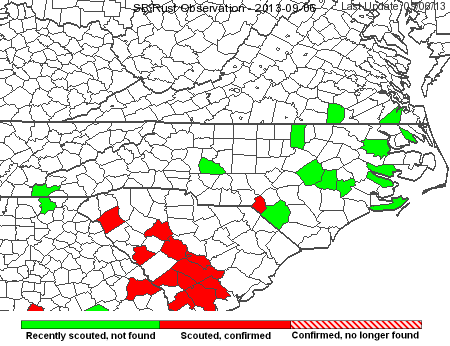Asian soybean rust was confirmed earlier today in Scotland County, NC. Scotland County is on the NC/SC border (see map below). There were sporulating pustules on 5 of 50 leaves examined. No soybean rust was found on leaf samples taken from Lenoir County, which is closer to Virginia. This puts soybean rust approximately 140 miles from South Hill, 160 miles from Emporia, and 190 miles from Suffolk. 
In general, we will only recommend a fungicide spray if soybean rust has been confirmed within 100 miles of our soybean fields. Therefore, there is no need to apply fungicide for control of soybean rust in Virginia at this time. Applying fungicide too early will only reduce its effectiveness once the disease arrives. Furthermore, soybean yield will not be affected if rust infects the crop after the R6 development stage (seed touching each other in the pod); therefore, fungicides are not recommended after the R6 stage, even if soybean rust is found close by.
Although soybean rust is not close enough to Virginia to initiate fungicide sprays at this time, the disease has moved faster than previous years. Most of our full-season (May-planted soybean) have reached the R6 stage (full-seed); therefore, these soybean are “safe” from any yield loss that may result from soybean rust infestation. However, much of our double-cropped soybean are still susceptible; they are anywhere from the R3 (early pod) to R5 (late pod) development stages. We will continue to monitor soybean rust movement across NC, continue to check soybean fields in Virginia, and let everyone know immediately if soybean rust is found in or close to Virginia.
For more details on Asian soybean rust and its movement, see the following website:
